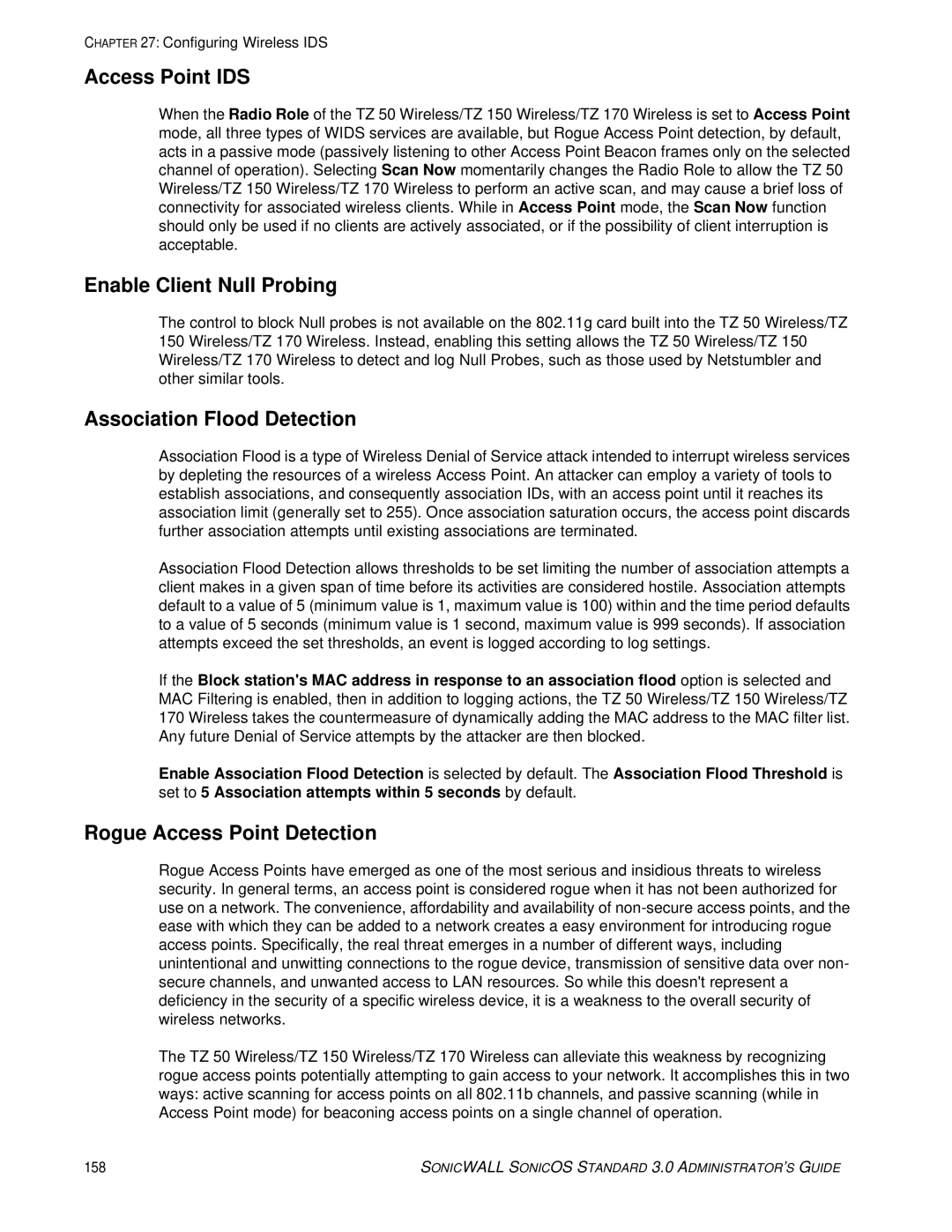CHAPTER 27: Configuring Wireless IDS
Access Point IDS
When the Radio Role of the TZ 50 Wireless/TZ 150 Wireless/TZ 170 Wireless is set to Access Point mode, all three types of WIDS services are available, but Rogue Access Point detection, by default, acts in a passive mode (passively listening to other Access Point Beacon frames only on the selected channel of operation). Selecting Scan Now momentarily changes the Radio Role to allow the TZ 50 Wireless/TZ 150 Wireless/TZ 170 Wireless to perform an active scan, and may cause a brief loss of connectivity for associated wireless clients. While in Access Point mode, the Scan Now function should only be used if no clients are actively associated, or if the possibility of client interruption is acceptable.
Enable Client Null Probing
The control to block Null probes is not available on the 802.11g card built into the TZ 50 Wireless/TZ 150 Wireless/TZ 170 Wireless. Instead, enabling this setting allows the TZ 50 Wireless/TZ 150 Wireless/TZ 170 Wireless to detect and log Null Probes, such as those used by Netstumbler and other similar tools.
Association Flood Detection
Association Flood is a type of Wireless Denial of Service attack intended to interrupt wireless services by depleting the resources of a wireless Access Point. An attacker can employ a variety of tools to establish associations, and consequently association IDs, with an access point until it reaches its association limit (generally set to 255). Once association saturation occurs, the access point discards further association attempts until existing associations are terminated.
Association Flood Detection allows thresholds to be set limiting the number of association attempts a client makes in a given span of time before its activities are considered hostile. Association attempts default to a value of 5 (minimum value is 1, maximum value is 100) within and the time period defaults to a value of 5 seconds (minimum value is 1 second, maximum value is 999 seconds). If association attempts exceed the set thresholds, an event is logged according to log settings.
If the Block station's MAC address in response to an association flood option is selected and MAC Filtering is enabled, then in addition to logging actions, the TZ 50 Wireless/TZ 150 Wireless/TZ 170 Wireless takes the countermeasure of dynamically adding the MAC address to the MAC filter list. Any future Denial of Service attempts by the attacker are then blocked.
Enable Association Flood Detection is selected by default. The Association Flood Threshold is set to 5 Association attempts within 5 seconds by default.
Rogue Access Point Detection
Rogue Access Points have emerged as one of the most serious and insidious threats to wireless security. In general terms, an access point is considered rogue when it has not been authorized for use on a network. The convenience, affordability and availability of
The TZ 50 Wireless/TZ 150 Wireless/TZ 170 Wireless can alleviate this weakness by recognizing rogue access points potentially attempting to gain access to your network. It accomplishes this in two ways: active scanning for access points on all 802.11b channels, and passive scanning (while in Access Point mode) for beaconing access points on a single channel of operation.
158 | SONICWALL SONICOS STANDARD 3.0 ADMINISTRATOR’S GUIDE |
